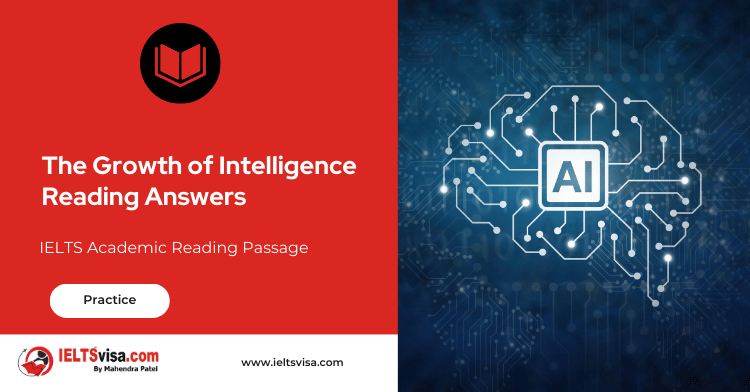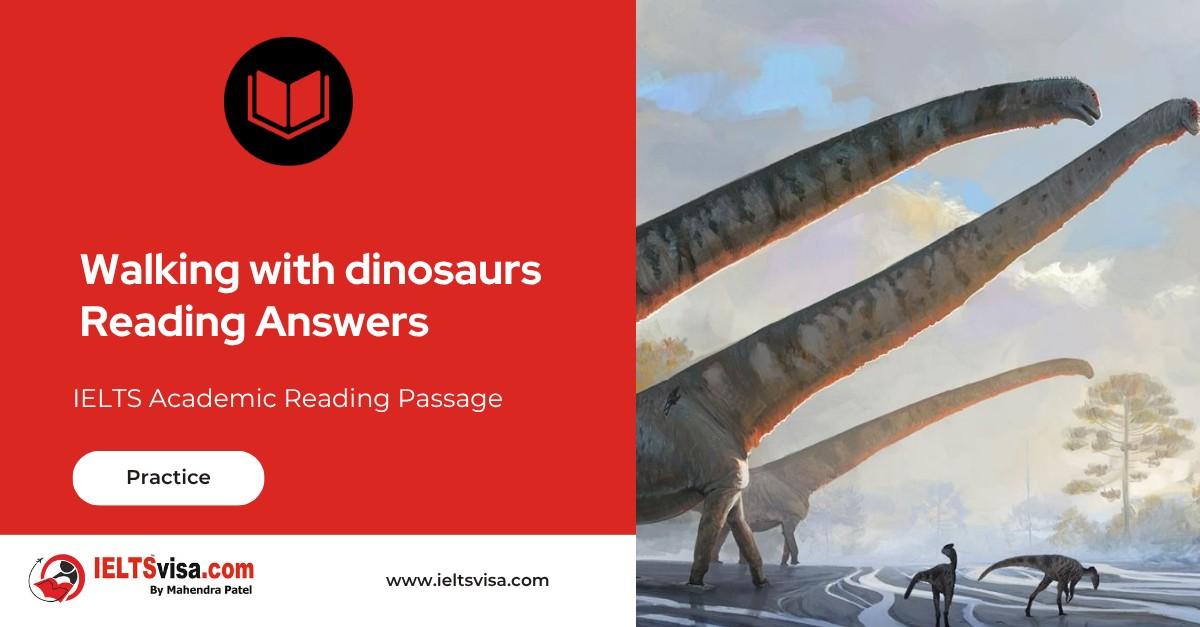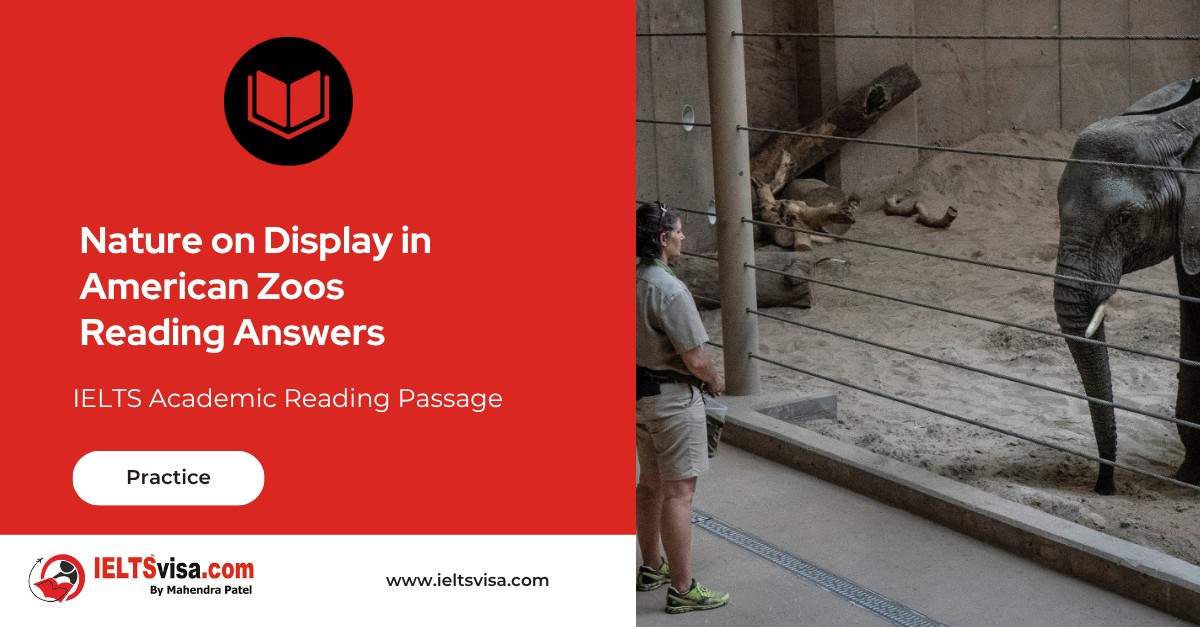The Growth of Intelligence Reading Answers
IELTS Academic Reading Passage
No one doubts that intelligence develops as children grow older. Yet the concept of intelligence has proved both quite difficult to define in unambiguous terms and unexpectedly controversial in some respects. Although at one level, there seem to be almost as many definitions of intelligence as people who have tried to define it, there is broad agreement on two key features. That is, intelligence involves the capacity not only to learn from experience but also to adapt to one’s environment. However, we cannot leave the concept there. Before turning to what is known about the development of intelligence, it is necessary to consider whether we are considering the growth of one or many skills. That question has been tackled in rather different ways by psychometricians and by developmentalists.
The former group has examined the issue by determining how children’s abilities on a wide range of tasks intercorrelate, or go together. Statistical techniques have been used to find out whether the patterns are best explained by one broad underlying capacity, general intelligence, or by a set of multiple, relatively separate, special skills in domains such as verbal and visuospatial ability. While it cannot be claimed that everyone agrees on what the results mean, most people now accept that for practical purposes it is reasonable to suppose that both are involved. In brief, the evidence in favour of some kind of general intellectual capacity is that people who are superior (or inferior) on one type of task tend also to be superior (or inferior) on others. Moreover, general measures of intelligence tend to have considerable powers to predict a person’s performance on a wide range of tasks requiring special skills. Nevertheless, it is plain that it is not at all uncommon for individuals to be very good at some sorts of task and yet quite poor at some others.
Furthermore the influences that affect verbal skills are not quite the same as those that affect other skills. This approach to investigating intelligence is based on the nature of the task involved, but studies of age-related changes show that this is not the only, or necessarily the most important, approach. For instance, some decades ago, Horn and Cattell argued for a differentiation between what they termed ‘fluid’ and ‘crystallised’ intelligence. Fluid abilities are best assessed by tests that require mental manipulation of abstract symbols. Crystallised abilities, by contrast, reflect knowledge of the environment in which we live and past experience of similar tasks; they may be assessed by tests of comprehension and information.
It seems that fluid abilities peak in early adult life, whereas crystallised abilities increase up to advanced old age. Developmental studies also show that the interconnections between different skills vary with age. Thus in the first year of life an interest in perceptual patterns is a major contributor to cognitive abilities, whereas verbal abilities are more important later on. These findings seemed to suggest a substantial lack of continuity between infancy and middle childhood. However, it is important to realise that the apparent discontinuity will vary according to which of the cognitive skills were assessed in infancy. It has been found that tests of coping with novelty do predict later intelligence. These findings reinforce the view that young children’s intellectual performance needs to be assessed from their interest in and curiosity about the environment, and the extent to which this is applied to new situations, as well as by standardised intelligence testing.
These psychometric approaches have focused on children’s increase in cognitive skills as they grow older. Piaget brought about a revolution in the approach to cognitive development through his arguments (backed up by observations) that the focus should be on the thinking processes involved rather than on levels of cognitive achievement. These ideas of Piaget gave rise to an immense body of research and it would be true to say that subsequent thinking has been heavily dependent on his genius in opening up new ways of thinking about cognitive development. Nevertheless, most of his concepts have had to be so radically revised, or rejected, that his theory no longer provides an appropriate basis for thinking about cognitive development. To appreciate why that is so, we need to focus on some rather different elements of Piaget’s theorising.
The first element, which has stood the test of time, is his view that the child is an active agent of learning and of the importance of this activity in cognitive development. Numerous studies have shown how infants actively scan their environment; how they prefer patterned to non-pattemed objects, how they choose novel over familiar stimuli, and how they explore their environment as if to see how it works. Children’s questions and comments vividly illustrate the ways in which they are constantly constructing schemes of what they know and trying out their ideas of how to fit new knowledge into those schemes or deciding that the schemes need modification. Moreover, a variety of studies have shown that active experiences have a greater effect on learning than comparable passive experiences. However, a second element concerns the notion that development proceeds through a series of separate stages that have to be gone through step-by-step, in a set order, each of which is characterised by a particular cognitive structure. That has turned out to be a rather misleading way of thinking about cognitive development, although it is not wholly wrong.
Questions 1-4
Choose the correct letter, A, B, C or D.
Write your answers in boxes 1-4 on your answer sheet.
1 Most researchers accept that one feature of intelligence is the ability to
A change our behaviour according to our situation.
B reacts to others’ behaviour patterns.
C experiment with environmental features.
D cope with unexpected setbacks.
2 What have psychometricians used statistics for?
A to find out if cooperative tasks are a useful tool in measuring certain skills.
B to explore whether several abilities are involved in the development of intelligence.
C to demonstrate that mathematical models can predict test results for different skills.
D to discover whether common sense is fundamental to developing children’s abilities.
3 Why are Horn and Cattell mentioned?
A They disagreed about the interpretation of different intelligence tests.
B Their research concerned both linguistic and mathematical abilities.
C They were the first to prove that intelligence can be measured by testing a range of special skills.
D Their work was an example of research into how people’s cognitive skills vary with age.
4 What was innovative about Piaget’s research?
A He refused to accept that children developed according to a set pattern.
B He emphasised the way children thought more than how well they did in tests.
C He used visually appealing materials instead of traditional intelligence tests.
D He studied children of all ages and levels of intelligence.
Questions 5-10
Do the following statements agree with the views of the writer in the Reading Passage?
In boxes 5-10 on your answer sheet, write
YES – if the statement agrees with the views of the writer
NO – if the statement contradicts the views of the writer
NOT GIVEN – if it is impossible to say what the writer thinks about this
5 A surprising number of academics have come to the same conclusion about what the term intelligence means.
6 A general test of intelligence is unlikely to indicate the level of performance in every type of task.
7 The elderly perform less well on comprehension tests than young adults.
8 We must take into account which skills are tested when comparing intelligence at different ages.
9 Piaget’s work influenced theoretical studies more than practical research.
10 Piaget’s emphasis on active learning has been discredited by later researchers.
Questions 11-14
Complete the summary using the list of words, A-l, below.
Write the correct letter, A-l, in boxes 11-14 on your answer sheet.
A adult
B practical
C verbal
D spatial
E inquisitive
F uncertain
G academic
H plentiful
I unfamiliar
Researchers investigating the development of intelligence have shown that 11…………… skills become more significant with age. One good predictor of 12……………………. intelligence is the degree to which small children are 13………………………… about their surroundings and how much interest they show in finding themselves in a 14…………………………………..setting.

Solution For: The Growth of Intelligence
Reading Answers
| 1 A | 2 B |
| 3 D | 4 B |
| 5 No | 6 No |
| 7 No | 8 Yes |
| 9 Not Given | 10 No |
| 11 C | 12 A |
| 13 E | 14 I |
Review and Practice
- Regularly practice with IELTS reading samples and time yourself to get used to the pressure of the exam.
- Review your mistakes to understand where you went wrong and how to avoid similar errors in the future.
Our Books
Master IELTS Speaking Part 1
IELTS Writing Task 1 Book
IELTS Writing Task 2 Book
The Growth of Intelligence Reading Answers Explanation
Comin Soon
Practice IELTS Other Modules
IELTS Listening
The IELTS Listening test assesses how well you can understand spoken English in various contexts. It lasts about 30 minutes and is divided into four sections with a total of 40 questions. The listening tasks become increasingly difficult as the test progresses.
IELTS Academic Reading
The IELTS Academic Reading section assesses your ability to understand and interpret a variety of texts in academic settings. It is designed to evaluate a range of reading skills, including skimming for gist, reading for main ideas, reading for detail, understanding inferences, and recognizing a writer's opinions and arguments.
IELTS Speaking
The IELTS Speaking test assesses your ability to communicate in English on everyday topics. It lasts 11-14 minutes and consists of three parts: introduction, cue card, and a discussion based on the cue card topic.
IELTS General Reading
IELTS General Reading tests your ability to understand and interpret various types of texts. Here are some key areas and types of content you can expect to encounter in the reading section, along with tips for effective preparation.
IELTS Academic Writing Task 1
In IELTS Academic Writing Task 1, you are presented with a visual representation of information, such as graphs, charts, tables, or diagrams, and you are required to summarize, compare, or explain the data in your own words.
IELTS General Writing Task 1
In IELTS General Writing Task 1, you are required to write a letter based on a given situation. The letter can be formal, semi-formal, or informal, depending on the prompt. Here’s a breakdown of the key components to include in your letter
IELTS Academic Writing Task 2
In IELTS Academic Writing Task 2, you are required to write an essay in response to a question or topic. Here’s a guide to help you understand the essential elements of this task
IELTS Exam Tips
To succeed in the IELTS exam, practice regularly, familiarize yourself with the test format, improve your vocabulary, develop time management skills, and take mock tests to build confidence.
Grammer for IELTS
Grammar is the foundation of effective communication in English. Understanding tense usage, subject-verb agreement, and sentence structure enhances clarity and coherence in writing and speaking.
Vocabulary for IELTS
Vocabulary plays a crucial role in the IELTS (International English Language Testing System) exam, especially in the Speaking and Writing sections. Here’s an overview of why vocabulary is important and how it impacts your performance
RECENT IELTS SAMPLES QUESTIONS AND ANSWERS
Walking with dinosaurs
Peter L. Falkingham and his colleagues at Manchester University are developing techniques that...
Money as the Unit of Amount Reading Answers
The most difficult aspect of money to understand is its function as a unit of account. In...
WEATHERING IN THE DESERT
In the deserts, as elsewhere, rocks at the earth's surface are changed by weathering, which...
Nature on Display in American Zoos
The first zoo in the United States opened in Philadelphia in 1874, followed by the Cincinnati...
Can We Prevent the Poles From Melting
Such is our dependence on fossil fuels, and such is the volume of carbon dioxide we have...
Air conditioning the earth reading answers
The circulation of air in the atmosphere is activated by convection, the transference of heat...













